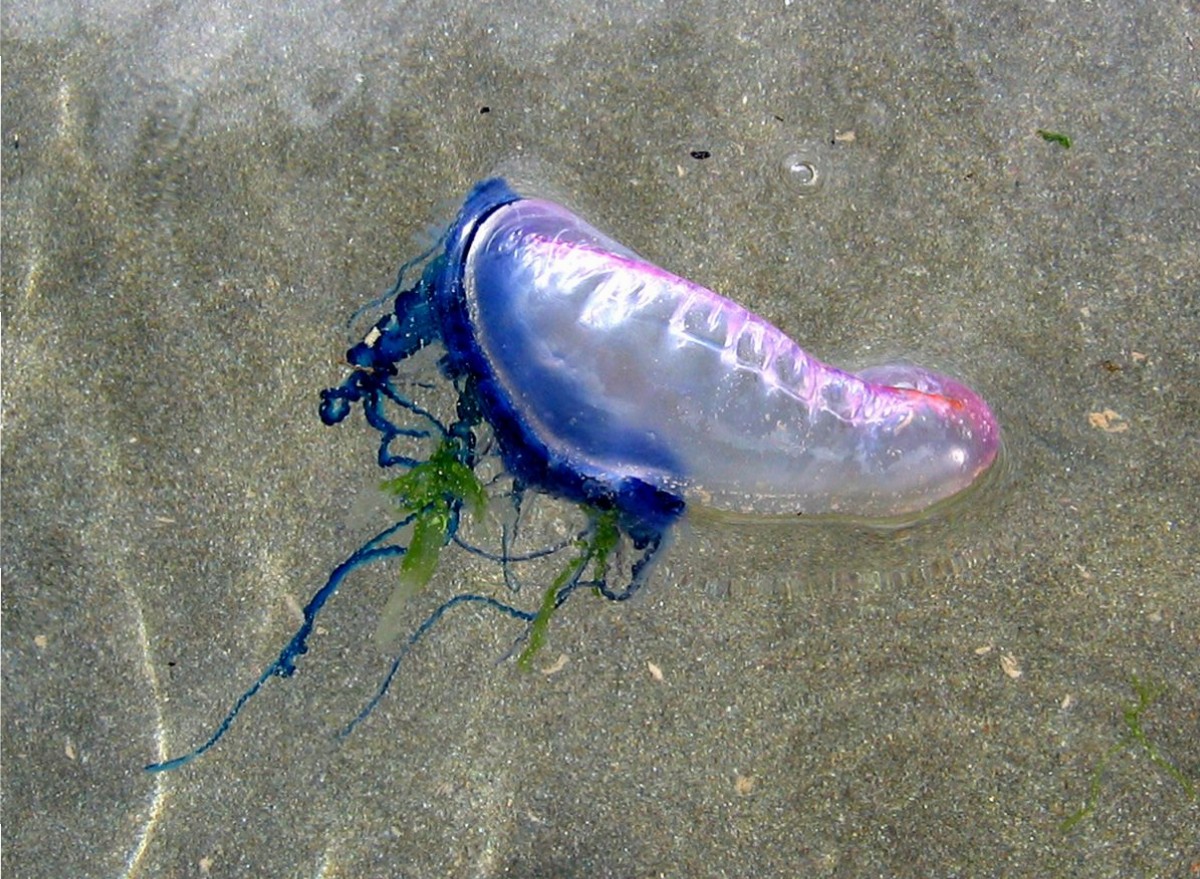News
Stinging Portuguese Man-of-War wash up on UK shores

Marine charity warns beach visitors not to touch this bizarre stinging creature that’s not a single animal but a floating colony
 The Marine Conservation Society (MCS) have received reports of several Portuguese Man-of-War washing up on beaches in Cornwall and Scilly Isles just weeks after authorities in Ireland warned local beach goers about a spate of recent strandings of this potentially dangerous floating sea creature.
The Marine Conservation Society (MCS) have received reports of several Portuguese Man-of-War washing up on beaches in Cornwall and Scilly Isles just weeks after authorities in Ireland warned local beach goers about a spate of recent strandings of this potentially dangerous floating sea creature.
Stings can be exceptionally painful and in extreme cases fatal.
MCS says the Portuguese Man-of-War (Physalia physalis) are only occasionally reported in UK waters with the last significant UK strandings of the species occurring in 2009 and 2012.
“We don’t receive reports of Portuguese Man-of-War every year, but when we do they can turn up in big numbers, usually around about this time of year,” said Dr Peter Richardson, Head of the MCS Biodiversity Programme. “In the last couple of weeks we’ve received several confirmed reports of Portuguese Man of War stranded on beaches around Cornwall and the Scilly Isles. With the earlier strandings in Ireland, these recent sightings could herald the arrival of more of the creatures as they get blown in from the Atlantic.”
The Portuguese Man-of-War isn’t a jellyfish but is closely related, and consists of a floating colony of hydrozoans – lots of really tiny marine organisms living together and behaving collectively as one animal. A Cornish pasty-shaped, transparent purple float is visible on the water’s surface whilst the blue, tentacle-like ‘fishing polyps’ that hang below the float can be tens of meters in length.
“It’s the tentacle-like polyps that can give an agonising and potentially lethal sting,” said Dr Richardson, “Because a stranded Portuguese Man of War looks a bit like a deflating purple balloon with blue ribbons attached, children will find it fascinating. So, if you’re visiting a Cornish beach this weekend it’s well worth making sure you know what these animals look like and that no one picks them up. We’d like people to report any sightings of Portuguese Man Of War to our website so we get a better idea of the extent of the strandings.“
One of the animals was found this weekend at Portheras Cove, near Morvah, Cornwall by volunteers of the Friends of Portheras Cove environmental group. Delia Webb from the group says it was found during a beach clean, lying among the plastic debris that had blown in on the high tide; “We find all sorts of strange and unusual items at our tiny Cornish cove, and we have had strandings of Portuguese Man of War before. They look amazingly beautiful, with hints of pink and blue, but thankfully we were aware of the potential danger lying beneath, and knew not to poke or prod it, just report the sighting to the MCS.”
If you spot a Portuguese Man-of-War then report the sighting immediately, ideally with a picture, to www.mcsuk.org, where a Jellyfish ID Guide, which includes the Portuguese Man O War, can also be downloaded.
Gear News
Introducing the TR-80, IR-50 and CS-30 Regulators from DYNAMICNORD

Whether you are a beginner or a professional diver – with the three new main regulators from DYNAMICNORD, everyone will find their favourite regulator. They all look super stylish.
Excellent performance with the TR-80
Quality and performance are the be-all and end-all for regulators. It is not for nothing that the TR stands for Tec Reg. The innovative design of the TR-80 guarantees absolute reliability – even in ice-cold waters.

Perfect breathing effort at 0.8 J/l / certified for diving in waters below 10 degrees / structural design made of solid brass for best cold protection / membrane-compensated design with dry seal of the first stage / reduced exhalation effort thanks to optimized exhalation membrane and bubble deflector / adjustable Venturi (dive/predive) and adjustment knob for individual inhalation comfort / innovative design of the front cover prevents free-flow in strong currents or when diving with scooters / design made of sandblasted brass, matt chrome finish / 2 HP and 4 LP outlets / mouthpiece made of high-quality, anti-allergic silicone for maximum comfort.


Amazing underwater adventures with the IR-50
The IR-50 is the top regulator for advanced and experienced divers. Natural breathing is the essence of this regulator.

Ideal breathing effort at 0.8 J/l /certified for diving in waters below 10 degrees / compensated membrane / adjustable venturi (dive/predive) and adjustment knob for individual inhalation comfort/ outlet valve and deflector for minimum exhalation effort and reduction of bubbles on the face / design made of sandblasted brass, matt chrome finish / 2 HP and 4 NP outlets / mouthpiece made of high-quality, anti-allergic silicone for maximum comfort.


The Workhorse – our CS-30
For diving centres and diving beginners – the workhorse stands for strong construction, reliability and robustness. Perfect for your training.

Optimal breathing effort at 0.8 J/l /recommended for diving in waters above 10 degrees / non-compensated piston / adjustable venturi (dive/predive) / outlet valve and deflector for minimum exhalation effort and reduction of bubbles on the face / design made of sandblasted brass, matt chrome finish / 1 HP and 3 NP outlets / mouthpiece made of high-quality, anti-allergic silicone for maximum comfort.


Octopus OP-30
The OP-30 is the ideal addition to all DYNAMICNORD regulators. It is identical in construction to the CS-30.

The TR-80, IR-50, CS-30 (DIN & INT) regulators and the Octopus OP-30 are available from DYNAMICNORD dealers and in the online store.
DYNAMICNORD – Your Outdoor Companion.
Marine Life & Conservation
Paul Watson Released as Denmark Blocks Japan’s Extradition Bid

Renowned anti-whaling activist Paul Watson has been released from custody in Greenland after spending five months in detention. Denmark’s Justice Ministry rejected Japan’s request for his extradition, citing insufficient guarantees that his time already served in custody would be credited against any potential sentence.
The 74-year-old Canadian-American was arrested on July 21 in Nuuk, Greenland’s capital, when his ship docked to refuel. His arrest was based on a 2012 Japanese warrant related to a 2010 encounter in Antarctic waters. Japan alleged Watson obstructed operations and caused damage to a whaling research ship during efforts to disrupt illegal whaling. Watson has consistently denied these claims, maintaining his commitment to marine conservation.
Denmark, which oversees extradition matters for Greenland, concluded that while the legal conditions for extradition were met, the lack of assurances from Japan regarding time-served credit made extradition untenable.
In a video shared by his foundation, Watson expressed gratitude and relief, saying, “After five months, it’s good to be out… and good to know they’re not sending me to Japan.” He added that the most difficult part of his time in custody was being separated from his two young sons.
Watson is a pioneering figure in marine conservation, known for founding the Captain Paul Watson Foundation in 2022 after decades of activism with the Sea Shepherd Conservation Society. His bold efforts to defend marine life have earned him widespread support, including from celebrities and conservationists. His work has also been featured in the acclaimed reality TV series Whale Wars.
Watson’s lawyer, Jonas Christoffersen, praised the decision, stating, “We are happy and relieved that Paul Watson is now free.” He added that Watson is eager to reunite with his family and continue his vital work.
The arrest occurred while Watson’s vessel, the M/Y John Paul DeJoria, was en route to the North Pacific with a team of 26 volunteers to intercept a Japanese whaling ship. His foundation described the arrest as politically motivated and emphasized that Watson’s actions were focused on ending illegal whaling practices.
Japan resumed commercial whaling in 2019 after leaving the International Whaling Commission, asserting that whale meat is a cultural tradition. Conservationists, however, continue to challenge these practices, highlighting their impact on marine ecosystems.
Despite the challenges, Watson remains steadfast in his mission to protect marine life and bring attention to whaling practices. His dedication to ocean conservation has made him a globally respected advocate for the environment.
-

 News2 months ago
News2 months agoIconic SS United States to become the World’s Largest Artificial Reef
-

 News3 months ago
News3 months agoBook Review – 52 Assignments: Underwater Photography
-

 Gear News3 months ago
Gear News3 months agoDYNAMICNORD – New German diving brand enters the British market
-

 News3 months ago
News3 months agoExploring Cenote El Pit: A Diver’s Dream
-

 Gear News3 months ago
Gear News3 months agoTry BARE drysuits (and maybe even win one!) this Friday with Sea & Sea at North West Dive Fest
-

 Marine Life & Conservation3 months ago
Marine Life & Conservation3 months agoBook Review: Coral Triangle Cameos
-

 Blogs2 months ago
Blogs2 months agoDive the Egyptian Red Sea this Autumn with Regaldive
-

 News3 months ago
News3 months ago2024 Ocean Art Underwater Photo Competition Announced















